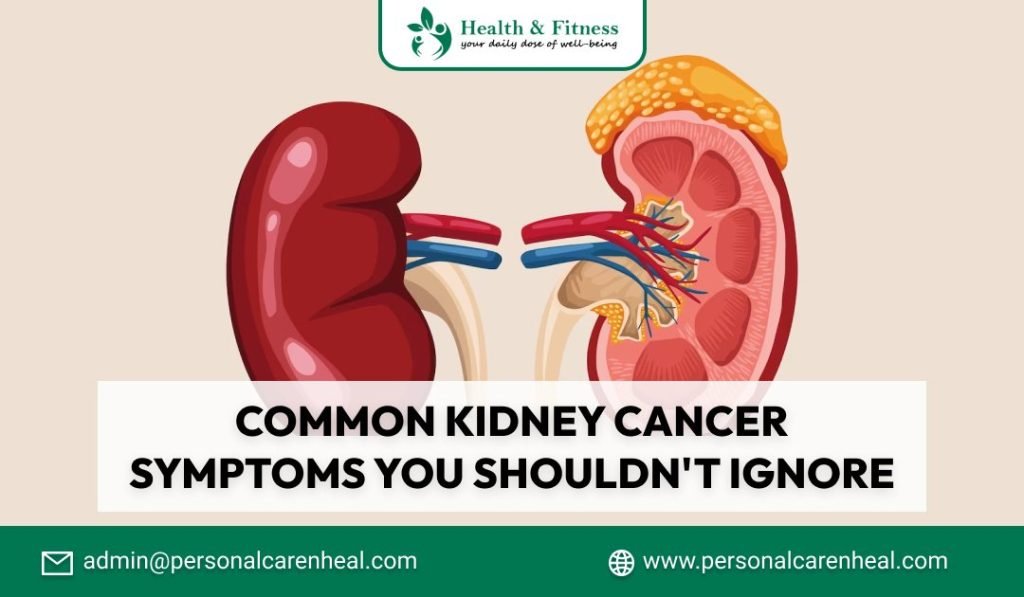Cancer is a disease in which cells of the body start growing uncontrollably. It can occur anywhere in your body. Kidney cancer is one of the types of cancer that starts in the kidneys. It occurs when healthy cells develop out of control in one or both kidneys and form a lump, known as a tumour.
What is a Kidney Cancer?
Kidney cancer happens with the abnormal growth of healthy cells in your kidney tissue. Over some time, these cells form a lump, called a tumour. Cancer starts when something triggers a change in cells, and they grow out of control. A cancerous tumour can spread to other tissues and organs. When it occurs, it is known as metastasis.
Kidney Cancer Symptoms
People affected with kidney cancer may notice one or more of the following signs. Symptoms are changes that kidney cancer patients may notice in the body. Sometimes, they may not experience any of the following kidney cancer signs. In other cases, the causes of symptoms may be a medical condition, not a cancer.
Blood comes in the urine
pain in the edges or back
legs and ankles swelling
high blood pressure
fatigue
loss of appetite
unexplained weight loss
a lump in the side or back
anemia
What are Kidney Cancer Causes?
The exact cause of kidney cancer is not known. However, some kidney cancer risk factors may contribute to kidney cancer:
Smoking: People with a smoking habit are at greater risk for kidney cancer.
Obesity: Overweight people are at higher risk for kidney cancer. Therefore, make sure to maintain your healthy weight.
High blood pressure: High blood pressure is also known as hypertension, which has been associated with an increased risk of kidney cancer.
Family history: If any of your family members have had kidney cancer, then you may be at higher risk of developing kidney cancer.
Radiation therapy: Women who have been treated with radiation for cancer of their reproductive organs may have a risk of having kidney cancer.
Gene changes: Genes have instructions for cell’s operations. Genes changes can increase the risk of growing kidney cancer.
Long-term dialysis treatment: Dialysis is the process that helps in cleaning your blood by passing it via a special machine. Dialysis is used when an individual’s kidneys don’t function properly.
Von Hippel-Lindau disease: People with this disorder may develop kidney cancer. It causes noncancerous tumours in blood vessels, especially in your brain and eyes.
How Kidney Cancer is Diagnosed?
If your healthcare professional thinks you may have kidney diseases, they may send you to a urologist, who is an expert in the urinary system. Your doctor may conduct various kidney cancer tests to help learn about your kidneys. The following are some tests you might expect:
physical exam and history
complete metabolic panel (CMP) to check organ function
complete blood count (CBC) and examine the blood for symptoms of the disease
urinalysis to check for blood, infection, and protein in the urine
MRI and CT scan to help check the stage of kidney masses
chest x-ray and bone scan to check if the cancer has spread
Kidney Cancer Types
There are various types of kidney cancer:
Renal cell carcinoma
Urothelial carcinoma
Sarcoma
Wilms tumour
Lymphoma
Kidney Cancer Stages
To determine your stage of kidney cancer, the doctor will use information from several tests, including MRI, CT, and biopsy.
Stage I: The tumour is 7 cm large or smaller than 7 cm and is solely in your kidney. It hasn’t spread to other tissues of the kidney.
Stage II: The tumour is larger than 7cm but it is still in your kidney.
Stage III: In stage 3, the tumour has spread to your blood vessels or into the tissues surrounding your kidney or near lymph nodes.
Stage IV: The tumour has spread in the outer area of your kidney or the blood vessels.
Kidney Cancer Treatment
Treatment for kidney cancer is based on the stage of the tumour as well as your health and age. Options include:
Surgery
Surgery is the treatment for most stages of kidney cancer. Several surgical options are available, including:
Partial nephrectomy
Radical nephrectomy
Ablation
Sometimes, cold and heat can remove cancer cells.
Cryoablation: In this procedure, your doctor inserts a needle via your skin and into your kidney tumour. The cells of cancer are then frozen with cold gas.
Radiofrequency ablation: Your doctor inserts a needle via your skin and into your kidney tumour. After that, an electrical current is passed to destroy cancer cells.
Radiation therapy
Your doctor may suggest you radiation therapy if you solely have one kidney or if you can’t go through surgery.
Targeted drug therapy
This therapy blocks certain features that help cancer cells grow. For instance, the drug can stop the growth of proteins that feed cancer.
Immunotherapy
Generally, it uses certain medications to enhance your own immune system. As a result, it helps your body identify and destroy cancer cells.
Chemotherapy
It is not a standard treatment for getting rid of kidney cancer. However, it can help in some cases – usually after trying targeted drug therapy and immunotherapy.
How long does it take to die from kidney cancer?
The five-year survival rate for stage 1, stage 2, stage 3, and stage 4 is 81%, 74%, 53%, and 8%, respectively.
Conclusion
The blog covers almost everything about kidney cancer. Hence, if you notice any of the above-mentioned symptoms, make sure to ask your doctor about this. Moreover, stay healthy and read our new health and fitness-related blogs by subscribing to Personal Care N Heal.



